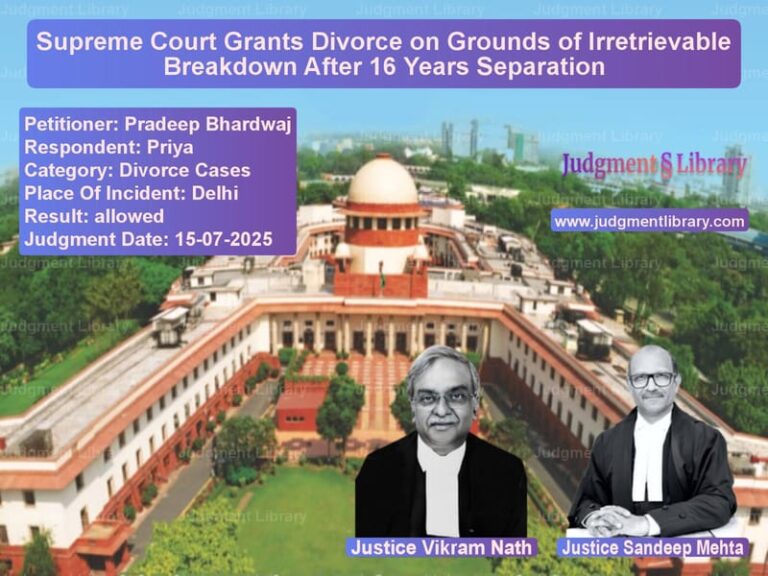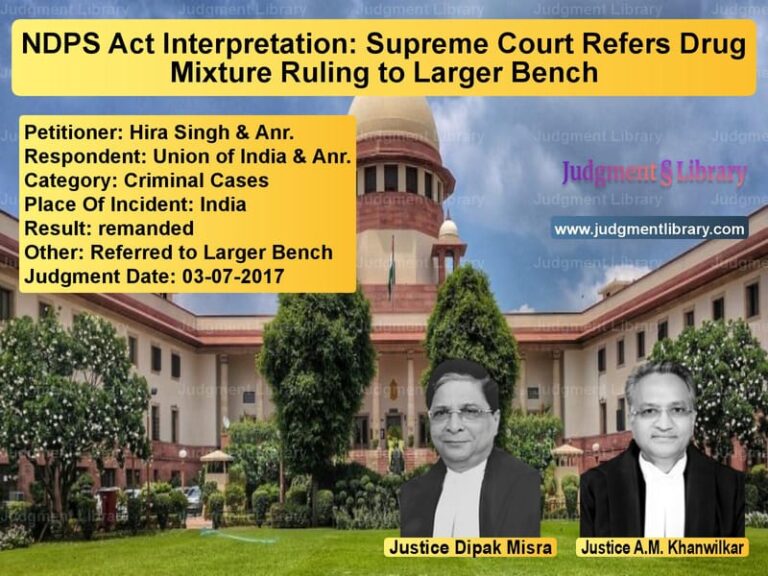Supreme Court Upholds High Court Order on Illegal Appointments of Hindi Stenographers in Uttar Pradesh
The Supreme Court of India, in the case of Wahab Uddin & Ors. vs. Km. Meenakshi Gahlot & Ors., delivered a significant judgment concerning the illegal appointments of Hindi Stenographers in the District Court of Moradabad, Uttar Pradesh. The Court upheld the Allahabad High Court’s order quashing the appointments of the appellants, who had been illegally retained in service despite not fulfilling the eligibility criteria. The ruling highlights the importance of due process in government appointments and ensures that merit-based selections are upheld.
Background of the Case
The dispute originated from the 1987 recruitment process for English and Hindi Stenographers in the Moradabad judgeship. The appellants participated in the selection process for English Stenographers, and a merit list was prepared on July 14, 1987. However, due to a lack of vacancies, the appellants were not given appointments.
Meanwhile, vacancies for Hindi Stenographers were available, and appointments were made based on the select list. However, since there were temporary leave vacancies, the appellants were appointed on a purely temporary basis as Hindi Stenographers for one month between October 14, 1987, and November 15, 1987. Their appointment letters clearly stated that their services would be terminated once regular employees resumed duty.
Subsequent Developments
In 1988, a fresh recruitment examination for Hindi Stenographers was conducted, and Respondent Nos. 1 to 3 were selected through due process. Since the appellants had been temporarily appointed against leave vacancies, their services were to be terminated upon the appointment of regularly selected candidates. However, instead of terminating the appellants’ temporary appointments, the District Judge, Moradabad, forwarded their case to the High Court.
The Deputy Registrar, High Court, issued an administrative order on May 22, 1990, directing that an approved list of former stenographers be prepared based on merit. A speed test was conducted for the appellants, but they failed to meet the prescribed speed requirements under Rule 5(c) of the Subordinate Civil Courts Ministerial Establishment Rules, 1947. Despite this, the District Judge retained the appellants and terminated the services of the newly selected candidates (Respondent Nos. 1 to 3).
High Court Proceedings
The affected candidates (Respondent Nos. 1 to 3) challenged the termination of their services before the Allahabad High Court. The High Court ruled in their favor, quashing the appointments of the appellants and reinstating the respondents.
The appellants filed a Special Appeal, which was dismissed by the Division Bench of the High Court on January 23, 2020. Dissatisfied with the outcome, they approached the Supreme Court.
Petitioner’s Arguments (Appellants)
The appellants argued that:
- They had worked continuously for more than 30 years and their services should be protected on equitable grounds.
- Their appointments had been approved by the High Court in 1990, and termination at this stage was unfair.
- The High Court had erred in applying Rule 14(3) of the 1947 Rules to their case.
- Since Respondent Nos. 1 to 3 had been appointed much later (in 2012), their claim over the posts was invalid.
Respondent’s Arguments (State of Uttar Pradesh & Reinstated Candidates)
The respondents countered by stating that:
- The appellants were never selected through due process but were retained through administrative manipulation.
- The 1987 selection list had expired in 1988, and the appellants could not claim rights based on an expired list.
- The speed test conducted for the appellants in 1990 showed that they did not meet the eligibility criteria.
- Their appointment was purely temporary and against leave vacancies, meaning it was legally untenable.
Supreme Court’s Observations
1. Select Lists Have a Fixed Validity Period
The Supreme Court noted that the 1987 select list was valid for only one year and expired in July 1988. It ruled:
“The appointment of the appellants based on an expired selection list is legally unsustainable.”
2. Failure to Meet Speed Test Requirements
The Court pointed out that the appellants failed to meet the speed test requirements under the 1947 Rules:
“Since the appellants failed the prescribed speed test, they were ineligible for appointment as Hindi Stenographers.”
3. Temporary Appointments Do Not Confer Permanent Rights
The Court rejected the appellants’ plea for protection based on long service:
“The appellants were appointed against leave vacancies on a temporary basis. Such appointments do not create a vested right for permanent absorption.”
4. High Court Was Correct in Reinstating Duly Selected Candidates
The Supreme Court emphasized that merit-based selections must be upheld:
“The respondents were appointed after a valid recruitment process, and their termination to accommodate ineligible candidates was unjustified.”
Final Judgment
The Supreme Court ruled:
- The appointment of the appellants as Hindi Stenographers was illegal and void.
- The termination of Respondent Nos. 1 to 3 was unjustified and was rightfully set aside by the High Court.
- Merit-based recruitment should not be compromised under administrative influence.
- The appeal was dismissed, and the High Court’s order was upheld.
Impact of the Judgment
The ruling has significant implications:
- Strengthens Merit-Based Recruitment: Ensures that government jobs are filled through proper selection processes.
- Prevents Arbitrary Extensions: Temporary appointments cannot be made permanent through administrative discretion.
- Reinforces Rule-Based Appointments: Select lists have a validity period, and appointments must adhere to recruitment rules.
- Limits Judicial Overreach: Courts should uphold due process rather than grant relief based on sympathy or long service.
Conclusion
The Supreme Court’s ruling in Wahab Uddin & Ors. vs. Km. Meenakshi Gahlot & Ors. sets a precedent for ensuring fairness and transparency in government recruitment. By upholding the merit-based appointment of the respondents and invalidating the illegal appointments of the appellants, the Court has reinforced the principle that public employment must be governed by established rules and procedures.
Petitioner Name: Wahab Uddin & Ors..Respondent Name: Km. Meenakshi Gahlot & Ors..Judgment By: Justice M.R. Shah, Justice A.S. Bopanna.Place Of Incident: Moradabad, Uttar Pradesh.Judgment Date: 13-11-2021.
Don’t miss out on the full details! Download the complete judgment in PDF format below and gain valuable insights instantly!
Download Judgment: wahab-uddin-&-ors.-vs-km.-meenakshi-gahlot-supreme-court-of-india-judgment-dated-13-11-2021.pdf
Directly Download Judgment: Directly download this Judgment
See all petitions in Recruitment Policies
See all petitions in Employment Disputes
See all petitions in Public Sector Employees
See all petitions in Termination Cases
See all petitions in Judgment by Mukeshkumar Rasikbhai Shah
See all petitions in Judgment by A. S. Bopanna
See all petitions in dismissed
See all petitions in Quashed
See all petitions in supreme court of India judgments November 2021
See all petitions in 2021 judgments
See all posts in Service Matters Category
See all allowed petitions in Service Matters Category
See all Dismissed petitions in Service Matters Category
See all partially allowed petitions in Service Matters Category







